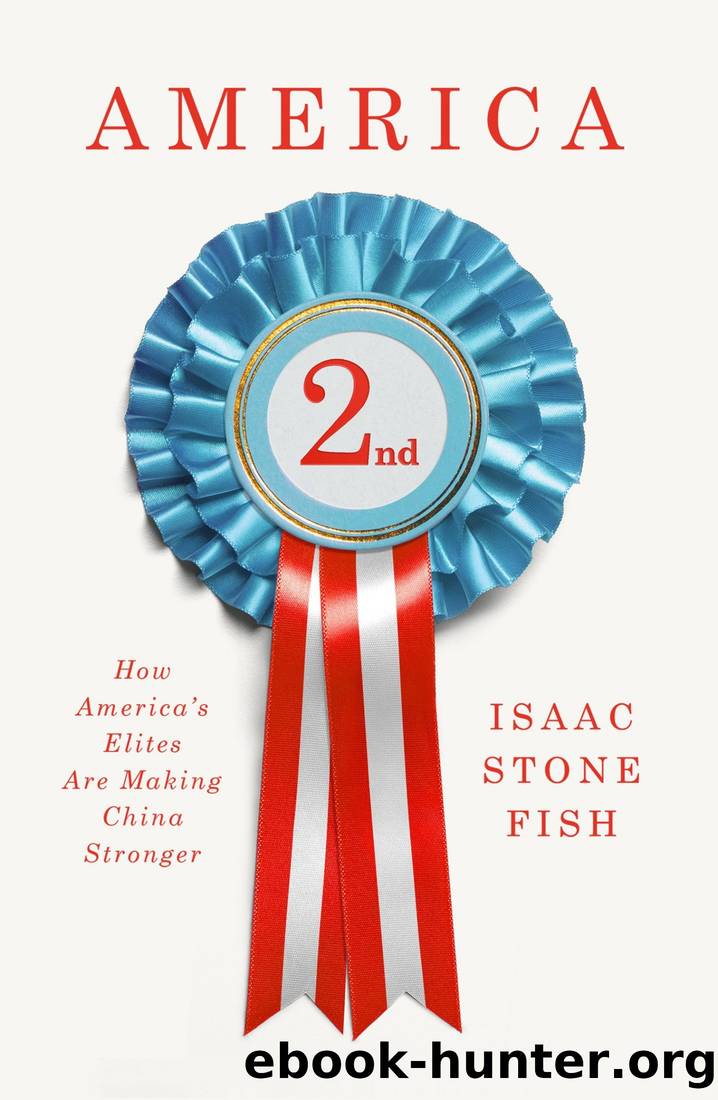America Second: How America's Elites Are Making China Stronger by Isaac Stone Fish

Author:Isaac Stone Fish [Fish, Isaac Stone]
Language: eng
Format: epub
Published: 2022-02-15T00:00:00+00:00
* * *
â
In a Shanghai airport in September 2019, I saw a Chinese edition of Bloomberg Businessweek. I wondered to myself if they eliminated sensitive words in their translation of storiesâin other words, if they censored their Chinese edition. I debated buying it and comparing it with the original, but then I stopped myself. My mind turned to Bloomberg TV: I donât have a financial relationship with the studio, but I regularly appear as a commentator on their shows, and I would be delighted if they paid me. Bloomberg producers never once told me to change the way I spoke or to tone down my criticism of Beijing: the closest they came was when they booked me to discuss a Chinese companyâs ownership of Grindr and asked me not to use the phrase âdick pics.â
I consoled myself by thinking that my workload was too heavy and that the story was unimportant. But itâs hard not to call it a moment of intellectual cowardice.
I self-censor. Sometimes I temper my criticisms to avoid offending people more supportive of the Party. Iâve also taken money from organizations linked to the Party and consulted for corporations that strive to maintain access to China. As is true with many of the targets of this book, my worst crimes were sins of omission rather than commission. What key stories did I shy away from because I wanted to preserve my access? What truths did I not uncover out of fear or greed? What crucial questions didnât I ask powerful people because I feared offending them?
Many people I interviewed about censorship mentioned a 2002 New York Review of Books article by Perry Link, a noted China scholar at the University of California Riverside who hasnât been able to enter mainland China since 1995.[40] Link said he doesnât know exactly why he was blacklisted, but that his work on the Tiananmen massacre cemented his status as unwelcome. In the article, Link compared Chinaâs censorship to an anaconda in a chandelier. âNormally the great snake doesnât move,â he wrote. âIt doesnât have to. It feels no need to be clear about its prohibitions. Its constant silent message is âYou yourself decide,â after which, more often than not, everyone in its shadow makes his or her large and small adjustmentsâall quite ânaturally.âââ
Perhaps my biggest conflict of interest comes from the World Economic Forum, the much derided and envied convener of an annual conference in Davos, Switzerland. For the last several years, Iâve written reports for it, attending sessions at Davos and taking notes for the forum to publish. It pays well and allows me both a free trip to Davos and access to prominent global officials. Do I hold my tongue about the sycophancy with which the forum addresses the Party leadership, allowing them to appear as a paragon of globalization and development while overlooking their crimes against humanity in Xinjiang? Yes. In January 2020, I attended a session with Rao Yi, a brilliant neurobiologist who spoke eloquently about renouncing his American citizenship after hearing of the horrors in Iraq and in Guantánamo Bay.
Download
This site does not store any files on its server. We only index and link to content provided by other sites. Please contact the content providers to delete copyright contents if any and email us, we'll remove relevant links or contents immediately.
The Secret History by Donna Tartt(19048)
The Social Justice Warrior Handbook by Lisa De Pasquale(12187)
Thirteen Reasons Why by Jay Asher(8893)
This Is How You Lose Her by Junot Diaz(6877)
Weapons of Math Destruction by Cathy O'Neil(6264)
Zero to One by Peter Thiel(5786)
Beartown by Fredrik Backman(5737)
The Myth of the Strong Leader by Archie Brown(5496)
The Fire Next Time by James Baldwin(5431)
How Democracies Die by Steven Levitsky & Daniel Ziblatt(5213)
Promise Me, Dad by Joe Biden(5141)
Stone's Rules by Roger Stone(5081)
A Higher Loyalty: Truth, Lies, and Leadership by James Comey(4951)
100 Deadly Skills by Clint Emerson(4920)
Rise and Kill First by Ronen Bergman(4778)
Secrecy World by Jake Bernstein(4740)
The David Icke Guide to the Global Conspiracy (and how to end it) by David Icke(4699)
The Farm by Tom Rob Smith(4502)
The Doomsday Machine by Daniel Ellsberg(4484)
